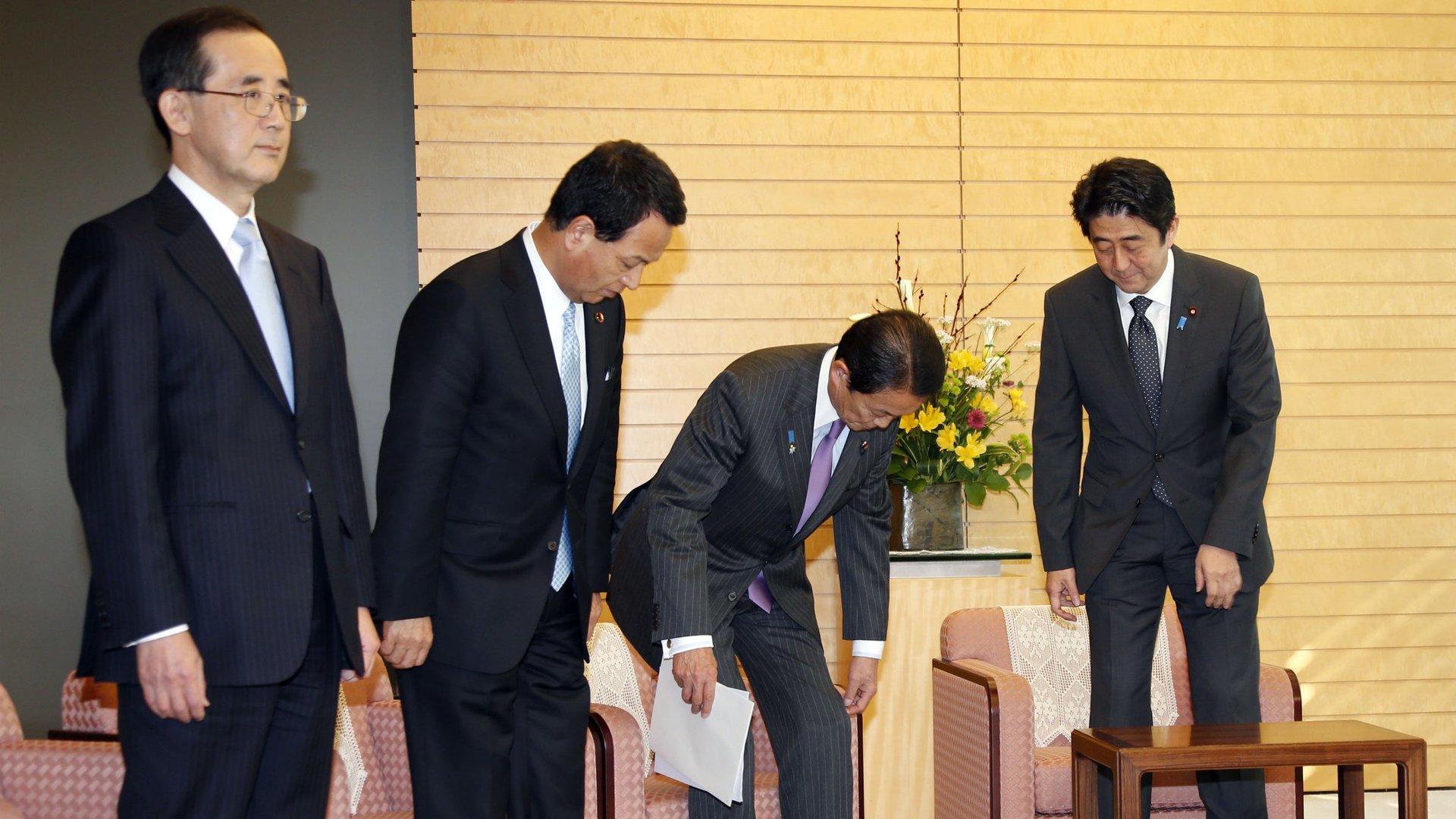Abenomics will mean less central bank independence. But if it’s Japan’s best shot at escaping deflation, does it matter?
Abenomics is turning out to be quite the drama. Yesterday, Japan’s central bank governor Masaaki Shirakawa announced his early resignation, sending shivers down the spines of those who see central bank independence as a crucial check against potential government excess.


Abenomics is turning out to be quite the drama. Yesterday, Japan’s central bank governor Masaaki Shirakawa announced his early resignation, sending shivers down the spines of those who see central bank independence as a crucial check against potential government excess.
Shirakawa’s surprise announcement was probably not due to his buckling under pressure from prime minister Shinzo Abe, as FT Alphaville explains in detail. But while Shirakawa’s early bow-out per se shouldn’t be read as erosion of BoJ independence, you can be pretty sure that the new appointment will be singing from the Abe hymnbook.
And that means Japan’s experiment will test whether much-vaunted central bank independence is vital—or whether it may just be hype.
Germany’s central bank head, Jens Weidmann, falls distinctly in the “not hype” camp, as he recently warned of “alarming violations” of Japan’s central bank independence. Nathan Sheets, Citigroup’s global head of international economics, does too. “If ever there were a country to have a social and political debate about the role of the central bank, it’s Japan,” Sheets said at a conference on Monday. ”There are certain lines across which the government should not tread. Some rights of the central bank should be held sacred.”
Others say that Bank of Japan’s long-standing failure to stem deflation has warranted political action. ”The Bank of Japan has not done a good job over time and thus it is up to the politicians to fix it,” economist Joseph E. Gagnon of the Peterson Institute for International Economics told Quartz. ”You still want to keep politicians out of the day-to-day setting of policy, but there must be some democratic accountability.”
Abe’s appointment to the BoJ governorship is likely to make open-ended asset-purchasing a reality—a plan that Shirakawa postponed until next year.
This is a big deal. The BoJ has never before embraced such an aggressive approach to defeating deflation. It’s come close, though. In 2006, a years-long program of quantitative easing finally whipped up inflation. The BoJ, however, promptly raised interest rates, plunging the country back into the deflationary cycle in which it’s mired still today.
This jittery conservatism is probably due to the government’s stratospheric debt obligations, says Stanford University economist Takeo Hoshi. ”If the financial markets suddenly realize that the Japanese government debt is not sustainable unless there’s huge inflation—if that happens, and high inflation [causes] high interest rates…the central bank has little to influence that change in market expectation,” Hoshi told Quartz.
That fear is probably what motivated Shirakawa, who is a staunch advocate of central bank independence, to resist Abenomics-style monetary easing. That’s not to say that he has been a passive governor. Quite to the contrary. But Shirakawa’s monetary policies have been unpredictable and inconsistent. That makes it difficult for the market to read and trust—which is critical to its effectiveness.
“The Bank of Japan has to do something more aggressive—or at least tell the market they’ll do something aggressive to tackle the deflation problem. And I don’t think they have done that,” says Hoshi. ”What Abe has been trying to achieve—that type of monetary policy is a move in [the right] direction. That type of aggressive policy is something that Japan should have adopted 10 years ago.”
Rallying around clearly spelled-out and aggressive Abenomic policy, the new BoJ team and the Japanese government stand a good chance of generating the escape velocity needed to propel Japan out of deflation. That would be a colossal triumph of central banking, to be sure. Of independent central banking, though, it would not be.